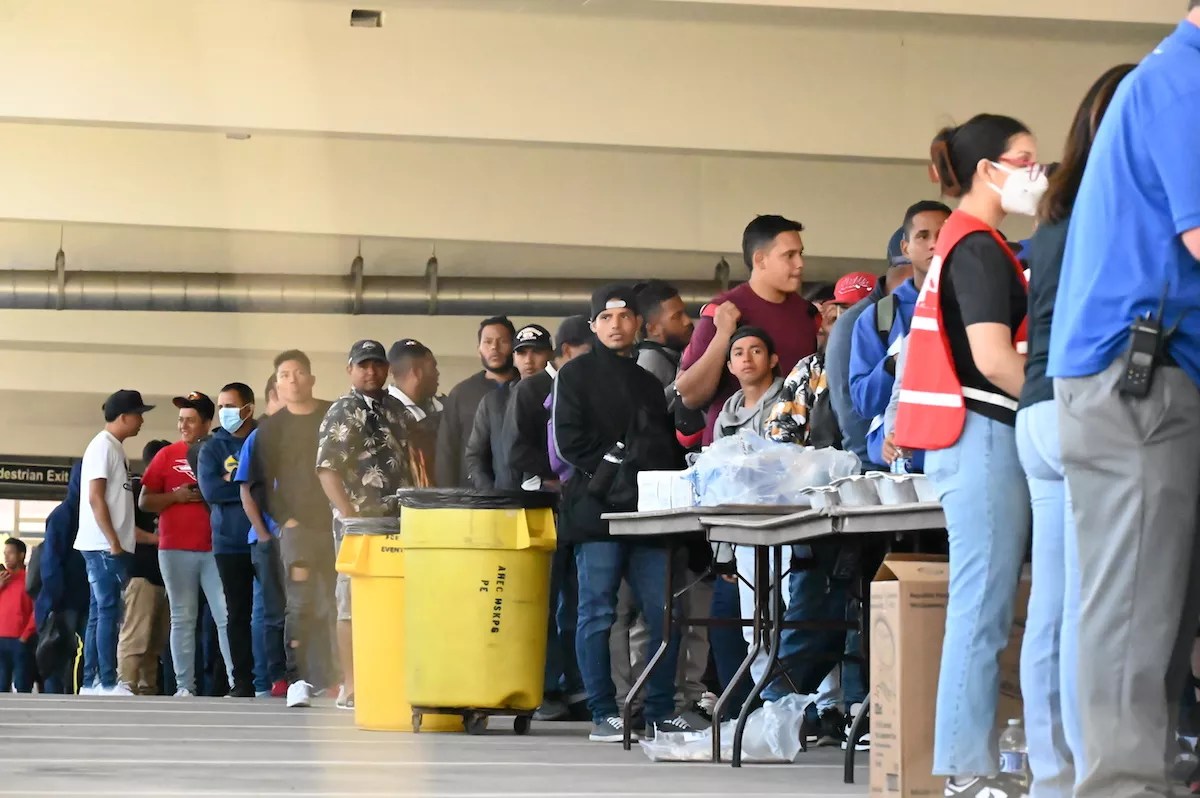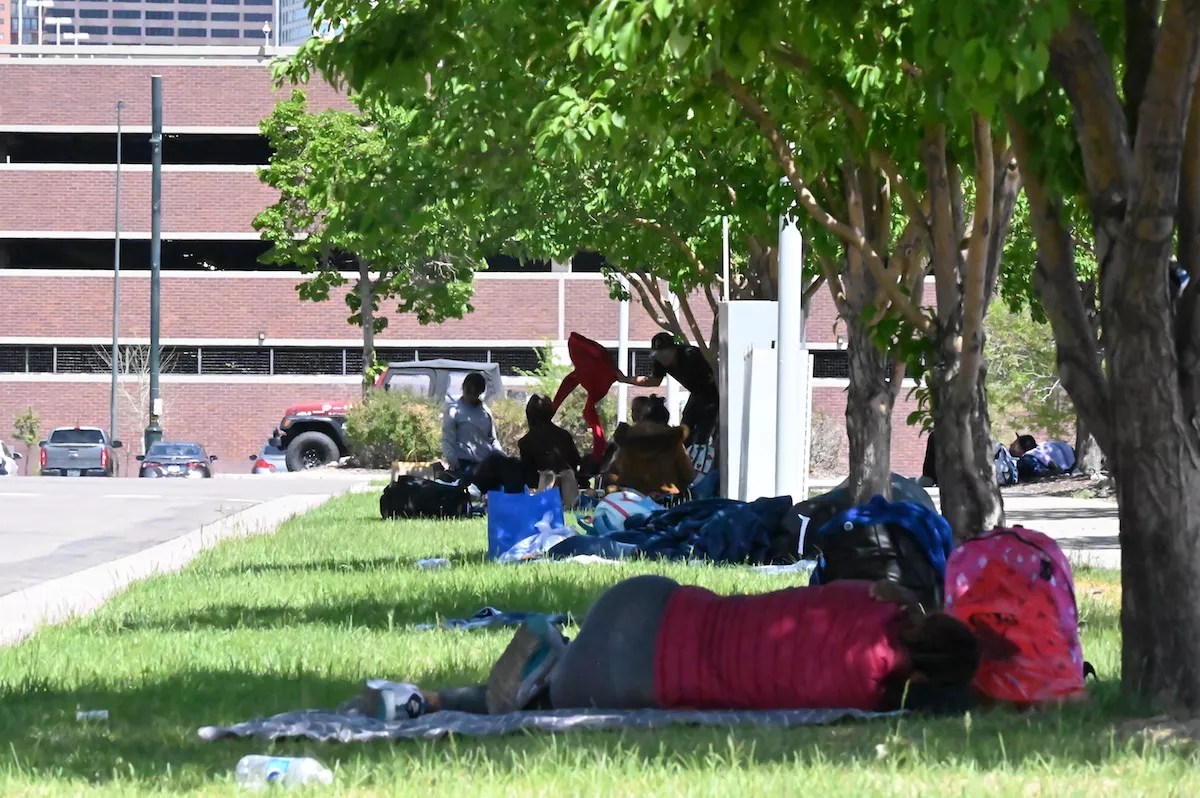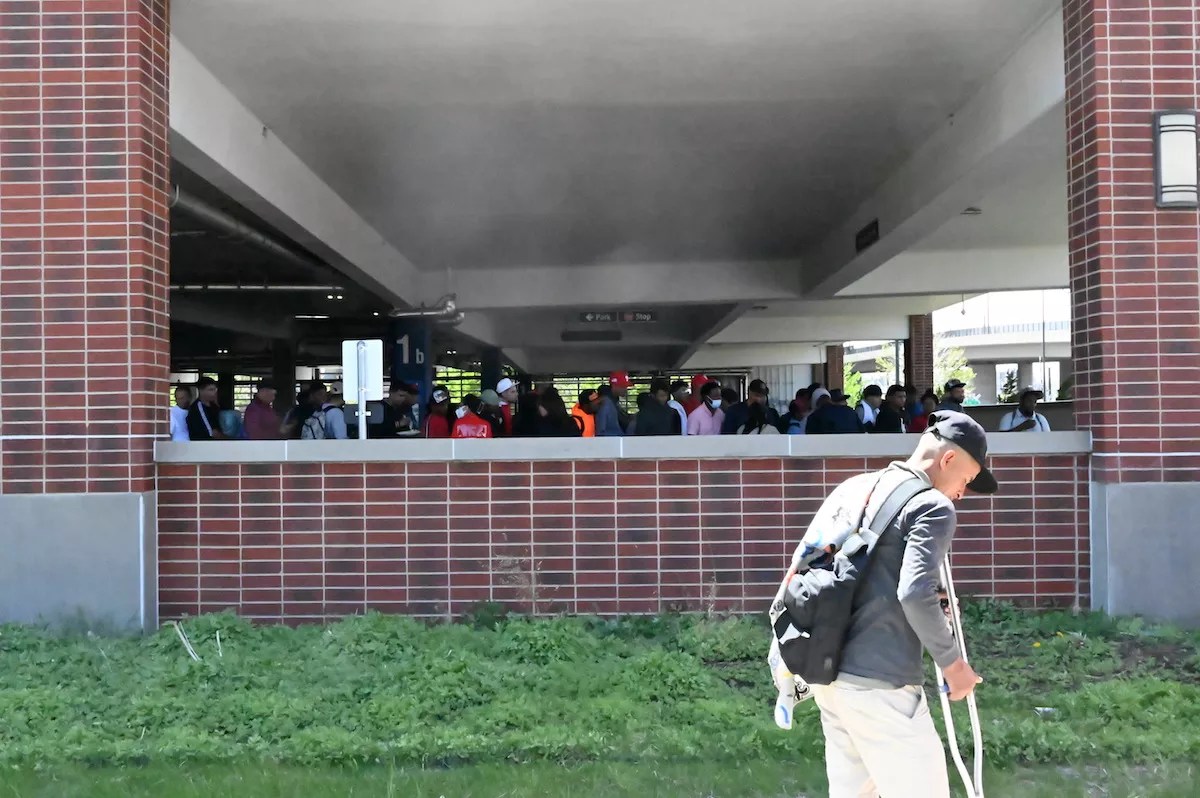
Bennito L. Kelty

Audio By Carbonatix
More than 250 migrants flocked to Denver this past weekend and are now living out of the 5th Street Garage on the Auraria Higher Education campus as they await processing.
Why?
According to advocacy groups, the city and its partner shelters are all currently full – with the unannounced and sudden appearance of these migrants over the past few days being completely overlooked by local officials.
Their arrival comes just days before May 11, when Title 42 (which prohibited migrants from seeking asylum in the U.S.) is scheduled to expire and Denver is set to lose a large chunk of the COVID-related emergency federal funding that it has used to provide shelter and resources to such migrants.
Most of the misplaced individuals are said to be Venezuelan. Some are undocumented and claim they came from El Paso with hopes of being transported to another city.
Sleeping bags and blankets have been set up inside the stairwells of the 5th Street Garage, where some of the migrants have been laying their heads at night. Others have set up makeshift living spaces outside, under trees and around the garage.
“Denver has begun to see an increased number of new migrant arrivals from the southern border,” the city said in a May 5 update.
Police and security have been patrolling the Auraria campus – which houses facilities for the University of Colorado Denver, Community College of Denver and Metropolitan State University of Denver – and are passing out food and water. Barricades are currently set up at the entrances of the garage, with police cars parked behind them. Porta-potties stand in one corner.
“They’re giving the opportunity to get to our family,” Maria Alejandra Calderon Prado, who walked alone from Venezuela to the U.S. southern border over the past three months, tells Westword in Spanish about why she came to Denver after originally waiting at the border in El Paso.
“We’re really thankful for the people here, to the police, who have been treating us well and helped us find food and water,” she says. “We’re really thankful for that.”
Calderon and other migrants with the group say that they came to the campus after hearing about the location “by word of mouth,” she adds.
“Since we’re all Venezuelan here, we’ve been communicating and following each other,” Calderon explains, noting how nearly all of the migrants are Venezuelan and how some have communicated and stuck together the “entire way” – that is, their entire journey from South America.
Calderon, who worked as a nurse in her home country, went to Colombia first with her three children, “but the situation got very bad there, too,” she says. “I decided to come to the United States.”
Calderon left her children in Colombia because “the jungle is very dangerous,” referring to the jungle of Panama – which she walked through before crossing multiple countries including Costa Rica, Honduras, Guatemala and Mexico.
While Calderon is documented and has the ability to go see her family, others say they aren’t so fortunate.
Kleber Rafael Rasendo Mendoza, who was standing on crutches outside the 5th Street Garage on Tuesday, May 9, says he’s not documented – but also that he’s “not worried.”
“In reality, no, I’m not worried,” he says. “I’m pretty calm about everything.”
Mendoza says he broke his ankle jumping off the border wall separating the U.S. and Mexico. Since getting into the U.S., he’s been able to rest and heal up but hasn’t sought much care, having found crutches while he was in El Paso.
Auraria officials began to notice the large group of migrants on Monday, just as schools were starting their final week of the spring semester and prepping for scheduled graduation ceremonies.
CU officials sent out an email to faculty and staff that day seeking urgent help.
The nonprofits American Friends Service Committee and Casa de Paz – both of which are dedicated to helping immigrants in the U.S. – showed up on campus to help pass out water and speak with the group in Spanish.
The City of Denver should have been prepared to house the large group, says Andrea Loya, the executive director of Casa de Paz, adding that the city likely knew about the migrants’ presence at Auraria.
“Denver didn’t do anything about it,” she says. “It sounds like everyone was just in a parking lot, so the Auraria campus has decided to set up stuff for them.
“Some of the people are saying that they’re being told there’s no capacity because [the City of Denver] didn’t know people were coming,” she continues. “But they’ve been coming since December.”

A few migrants from Venezuela lay their sleeping bags out under the shade of the trees outside the 5th Street Garage on the Auraria campus.
Bennito L. Kelty
In December, the average number of migrants arriving in Denver was an estimated 250 or more a day, Loya notes. That number dropped off for several months, but this weekend more than 400 arrived daily, she says.
The City of Denver – which reports the average number of migrants arriving and being sheltered by the city or partners – says nearly 530 migrants have arrived since Sunday.
Almost 8,700 migrants have come to Denver since December 9, the city reports.
The number of migrants currently in local emergency shelters was 149 as of Tuesday, while the number in partner emergency shelters was 795. Loya estimates that more than 250 migrants are at the 5th Street Garage waiting for help.
Throughout April, Denver saw about twenty to thirty migrants arriving each day looking for shelter or transportation in the city. “The number of new arrivals has been increasing significantly,” according to the May 5 update.
“Two of Denver’s four migrant shelters are at capacity and the remaining two are nearing capacity,” the city reported on Friday. “Shelter capacity will fluctuate based on the number of newly arriving migrants, the number of departing migrants each day and the availability of rooms in the non-congregate shelters.”
On Monday, Denver started following updated federal guidance to offer available emergency shelter only to migrants who have already talked to U.S. immigration officials.
Once federal funding gets cut off on May 11, Denver will only receive about $909,000 of the $332.5 million available through the Emergency Food and Shelter Program.
“The city continues to call on Congress and the Biden administration to address this nationwide issue and advocate for local communities such as Denver that have been disproportionately tasked with handling and managing what is a growing national humanitarian crisis,” said the May 5 report.
The 5th Street Garage, which is close to Ball Arena and a few blocks west of the Tivoli Student Union, has been used as an intake center – or a place where recently arrived migrants can connect with housing services – for more than a month now, according to Jennifer Piper, a spokeswoman for AFSC.
People who had traveled with the group were awaiting intake at the garage, but no one showed up to receive them.
On Monday around noon, a mass email from the University of Colorado’s Department of Emergency Management went out to staff and faculty asking for Spanish speakers to assist “these migrants with transition needs.”
“We could urgently use your help,” the email read. “We are reaching out to you with an urgent and unusual request for your assistance. The dean has received notice that a large number of Spanish-speaking migrants have been arriving at the downtown campus today.”
Loya says that AHEC had the situation handled “surprisingly well considering the time and resources they were given” by the time Casa de Paz and AFSC showed up to provide support.

Kleber Rafael Rasendo Mendoza, from Venezuela, stands in the sun outside the 5th Street Garage. He says he’s not used to the weather in Denver.
Bennito L. Kelty
Many of the migrants were encouraged to come to Denver from El Paso because “Denver will then help them purchase tickets elsewhere,” Loya says.
“The border is receiving a lot of people, and over 50 percent are making their way to Denver because it’s $90 [by bus] from El Paso to Denver, and they’re being told Denver will help them get elsewhere.”
Migrants such as Calderon and Rasendo say they left Venezuela because wages are very low and prices are very high.
A man named Alexander Hernandez says he worked for the Venezuelan government but was threatened with imprisonment for speaking out against the Nicolás Maduro dictatorship, prompting him to flee. Hernandez says he’s started the process for seeking asylum.
Campus officials confirmed to Westword that they didn’t know the group had arrived and had been waiting at the 5th Street Garage.
The City of Denver, meanwhile, says, “This is a significant increase, with no notice, from the twenty to thirty people coming to Denver for much of March and April,” according to Victoria Aguilar, spokesperson for the Department of Human Services.
But Loya says Denver was “aware” of the large group seeking help at the garage, and that AFSC and Casa de Paz “have been talking to them since before December that this was going to happen, and this has definitely been the case.
“The Auraria campus did not know,” she adds. “They’re a college campus, so I would not think that they would be resourced for this. I’m actually really, really impressed that they pulled this off and decided to help, because they could have just turned a blind eye.”
The City of Denver is “working with community partners to increase capacity for completing the intake process and providing transportation service for newly arriving migrants” and “coordinating with community- and faith-based partners to assist migrants who wish to make Denver their home,” says Aguilar.
“The city is specifically requesting that the faith-based community provide overnight sheltering for migrant guests who are scheduled to leave Denver the next day,” Aguilar continues. “We will continue to connect everyone who arrives in the city with support services and resources, regardless of immigration status.”
Recently arriving migrants and those already in emergency shelters have been gifted “backpacks filled with hygiene products,” and several people with the group say that they’re receiving everything they need, despite the severity of their situation.
“Well, to tell the truth, I haven’t bathed, but I’m all right with that,” Calderon concludes. “I’ve seen much worse conditions in Mexico.”